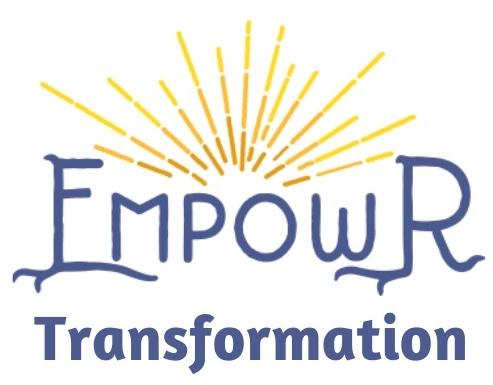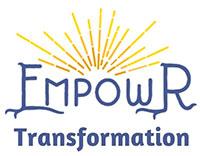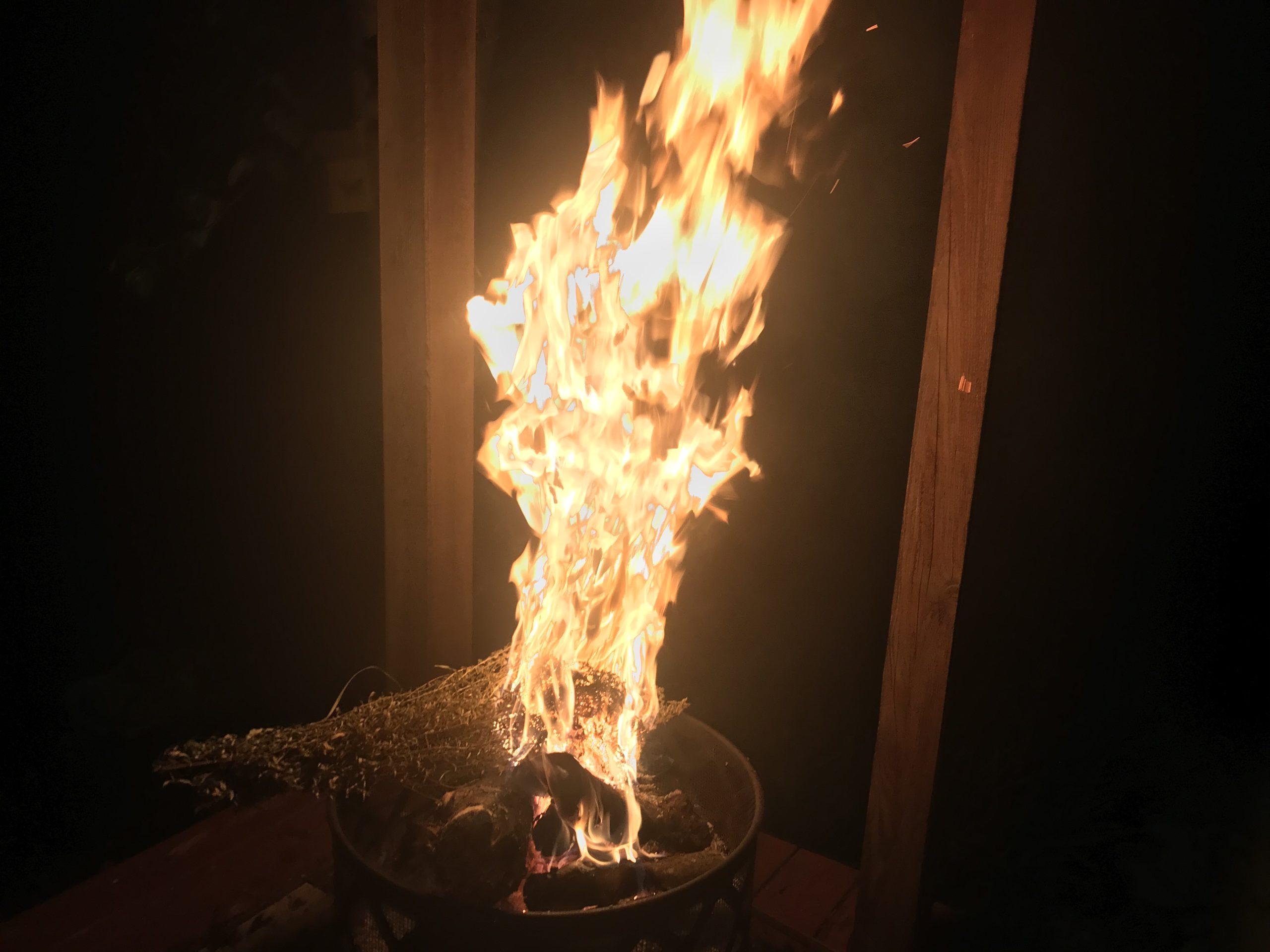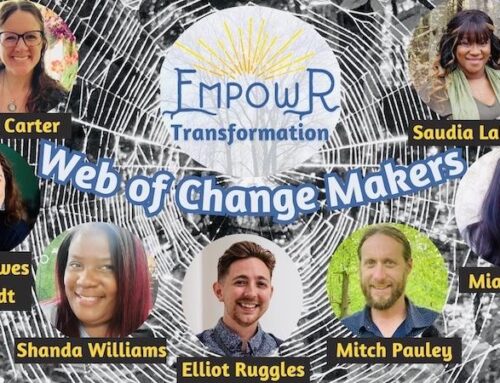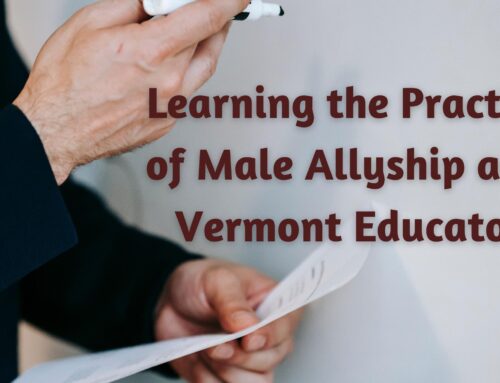Personal reflections from a white woman to other white people about unpacking privilege, uncovering the truth of white supremacy culture, and how we can support healing of the deadly disease of racism.
Several years ago, my understanding of white supremacy was a condition portrayed by the worship of Fox News, hanging a confederate flag in the window, and uttering racial slurs almost out of earshot in public.
When I first examined the concept of white privilege, I had a typical white person response. I felt the need to justify how hard I had worked for everything I had. I felt injustice over my own struggles with downward socio-economic mobility and the economic disempowerment of living in a rural state.
As a lover of rainbows, I was someone who saw all colors and believed in the Disney view of “we’re all equal” and “we’re all one.” I based my opinions on the words and actions of individual people and how they “behaved” in society.
I didn’t get it.
[trigger warning for people of color] Growing up in a rural almost all-white part of Western Massachusetts, I reflect on the racists messages I received: Affirmative action was unfair to lower class white people. Do not marry someone from a different race because the marriage will never be accepted by society. Racism only existed in the South. Black people should learn to speak English without slang and Latinos should have to speak English because it is the language of America. I was told that black people had every opportunity to bring themselves out of poverty, they were just lazy and don’t get out of their own way because of the lure of drug money and rapper aka “thug” lifestyle. I was told is was “so sad” that Native Americans became alcoholics and that they had all the same opportunities as everyone else.
***Please take a deep breath. These are shocking and I share because I know many white people have heard and may still believe similar messages. We need to recognize these are the types of false narratives that perpetuate white supremacy culture. Racism is not only learned, it is embedded into very deep fabrics of our world views, and as epigenetic research shows, our DNA. All of these messages were delivered by people who would claim the KKK is an abomination, the Civil Rights Movement was important, and that “they-are-not-racist.”***
I remember struggling with these messages, not fully believing them yet not having any other narrative to draw from, being a white woman socialized with white people in white institutions. Always believing I could formulate my own belief system, I had no way of knowing how deeply embedded in racism so much of my upbringing was, even though I had never witnessed any aggressive or direct acts of racism. I was completely unaware and how much the narratives I grew up with about people with skin color that wasn’t white affected my values, perceptions, behavior, and worldview as a white woman.
Headstrong, with my own opinions, I challenged the status quo from an early age and sought to expand my experiences beyond small town America. Exercising my privilege (which at the time I had no understanding of), I engaged in statewide and national youth leadership programs where I frequently interacted with people from diverse racial and cultural backgrounds. I attended a racially diverse college, and lived and worked in both Poughkeepsie, New York and Nashville, Tennessee where I closely interacted with many non-white skinned people–as friends, colleagues, and supervisors.
Like many white people, I was proud of the relationships I developed with racially diverse people.
I felt like I understood enough about racism to not engage in racist behavior and after all, I had black and brown skinned friends.
I still didn’t get it.
In 2000 I moved to Vermont and my interactions with people who had black and brown skin slowed considerably. I settled into life in safe, privileged, progressive/libertarian/provincial all-at-the-same-time Vermont.
I felt removed from racism until Trump was elected and overtly racist behaviors began to increase in alarming ways throughout the state—included being directed at my sprinkling of friends with black and brown skin. I was appalled, yet I struggled to understand Black Lives Matter. I too thought, yeah, but don’t all lives matter?
I didn’t understand Black Lives Matter as an aspirational statement—that until black lives matter, all lives DON’T matter. I didn’t understand why it mattered in Vermont, which is mostly white, and believed our biggest challenge was economic disparity and classism. I didn’t understand the connection between economic inequality and systemic racism.
Then I got cancer and began to wake up—about everything. My entire worldview was torn apart.
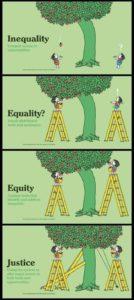 The experience of being diagnosed with and treating cancer brought sharp attention to the inequities in healthcare. As I slogged through self-navigating a treatment path inclusive of both conventional and holistic medicine, I noticed the covert signs of racism in the extremely white “cancer club.” From the lack of access to support to the preferential treatment of people who were white and upper class presenting. From the language/images used (or not used) in materials to the dismissal of anything that is not “evidence-based” and comes from any cultural tradition outside of white dominant norms. From the higher rates of breast cancer in black women to the lack of regulation in cancer-causing products to even less regulation in black women’s hair products to the black women using so many products so they can have hair that looks more “white.”
The experience of being diagnosed with and treating cancer brought sharp attention to the inequities in healthcare. As I slogged through self-navigating a treatment path inclusive of both conventional and holistic medicine, I noticed the covert signs of racism in the extremely white “cancer club.” From the lack of access to support to the preferential treatment of people who were white and upper class presenting. From the language/images used (or not used) in materials to the dismissal of anything that is not “evidence-based” and comes from any cultural tradition outside of white dominant norms. From the higher rates of breast cancer in black women to the lack of regulation in cancer-causing products to even less regulation in black women’s hair products to the black women using so many products so they can have hair that looks more “white.”
I witnessed the injustice of the entire health insurance system, being based on “professional” jobs, more often held by white people. I experienced the inequity of my own privilege to raise money to access holistic treatments and medicine which are inaccessible to so many, including my having access to people with wealth who could offer the financial support for a Go Fund Me–recognizing many people do not have access to financial support–in addition to the inequities surrounding the health insurance system. The rapid blast of these injustices flipped a switch in me. I abruptly began to peel back the layers of understanding the privileges I have just because I’m white and recognizing not all white people have the same privileges, but we all have more than people with brown and black skin.
Disruption of a Worldview
As someone whose entire life has been dedicated to understanding and working towards solutions of root causes, getting to the root cause of the cancer in my body was the premise of my entire health crisis. While I underwent medical testing to reveal the underlying genetic mutations from a DNA perspective, I also embarked on a quest to learn about my ancestry. I was seeking common threads of resilience and instead found the truth of the trauma my white, Anglo-Saxon ancestry has inflicted upon people of color.
The spiritual awakening I often reference in sharing my vulnerabilities through the experience with cancer is deeply connected to the awareness that so much of what I learned in school, and my personal upbringing, was a lie. Realizing my entire worldview was breaking apart was unnerving to say the least. Learning to understand what it meant to be socialized in “whiteness” became an integral part of my healing journey. Healing from the disease of racism as being connected to my experience navigating cancer, is something I find challenging to communicate without creating much misunderstanding with how much the lack of time prohibits getting into more nuanced conversations. Part of using my privilege to speak these truths for racial and economic justice is what I consider a responsibility for humanity and healing the wounds of my ancestors.
I became painfully aware of the truth of what a country founded on colonialism really means and the suffering that was (and continues to be) inflicted on the original people of this land, the people brought to this land to generate its wealth, and the land itself. America was forged out of violence and genocide. We, as white people have only heard one perspective—and it is based in lies. There are always multiple sides to a story, and in this case, the perspective of black and brown people was intentionally kept out of history to pave the way for the political and financial rise of the white ruling class in exchange for the oppression of people of color, and ultimately the class divides that are ruining the country.
The Trauma of Oppressor Ancestry
I was always so proud that my great-grandfather was a Vermont Legislator. Then I learned it was during a time when Abenaki and other First Nation people were being sterilized on the very soil where Vermonters now grow their food.
Next I began to understand the foundation of the success and growth of capitalism and how it its generation of unequal wealth for the white upper classes is based in theft—stealing people from their own culture, land, and power to ship them across the world to generate the wealth of white Americans through physical, emotional, and spiritual genocide.
[trigger warning to black and brown people] I remember reading a passage in American Gods by Neil Gaiman while I was sick that spoke from the perspective of a black enslaved woman. It shared her story from being snatched from her home, a terrifying arrival in America, being torn away from her husband, raped repeatedly, and finally watching her children fight with the pigs to eat scraps of food from the trough.
Reading that was the final straw in never being able to return to any former life. I thought of how many times I have heard white people say black people just need to “get over” something that happened hundreds of years ago. When those are the collective stories of an entire people passed down to children, with themes that continue to play out through systemic racism today, there is no “getting over”, only pain and suffering on repeat. Furthermore, because the truth of what happened to black and brown people are NOT the stories of white ancestry—white people, have absolutely NO RIGHT to form opinions about the lived experiences that we DID NOT experience and can never, ever truly understand.
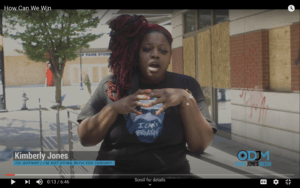
Kimberly Latrice Jones speaks about Black Lives Matter protests
We, as white people, feel we are entitled to an opinion about everything. And we are being told by non-white skinned people that it is not our place to have an opinion about their lived experience. And we, as white people do not like to be told what to do, ESPECIALLY by black people, yet we’re okay with telling people of color what to do all-the-time. THAT is white supremacy culture. Now white people are being asked to listen and to act on behalf of ending racism. Our work as white people is to hear the voices of non-white people, to unlearn the white side of history, and change our individual and societal behavior. It is time for us to learn the truth about why we white folks have privilege and why people of color are protesting, rioting, and looting (three different types of people—see this video by writer and director Kimberly Latrice Jones who makes a crystal clear distinction between the three).
As white people unlearn the false history we have been told, we can shift into relearning so we can deconstruct and rebuild a nation based on equity, justice, acceptance, compassion, healing, and liberation—for ALL beings in society. Yes, there are still so many inequities for many white people. No one is saying there is not. Changing the systems of oppression will benefit everyone except the people at the top with the majority of wealth and power. The sooner we can recognize and hold accountable the wealthy, white elite as the ones with the interest and power that is fostering the divisiveness, the more chance there will be that we do not tear each other apart. We are being played like pawns in a game that only brings harm. We need to wake up! The sooner we realize that, the sooner we can learn to embrace our diversity, instead of dividing like puppets in a system that only cares about the power and wealth of the white elite.
This work is hard.
I write this article for the white people in my life who are struggling to understand. I know words are triggers and hearing white privilege, white supremacy, and racist make many shut down. I recognize many white people feel under-appreciated, over-worked, under-paid, and experience a lot of inequity and injustice in daily life. These feelings are valid and these experiences are true. When we can see how the structures, norms, and behaviors in dominant white society that place less value on people’s lives because of the color of their skin are the root cause of all of our suffering, then and only then can we work together towards liberation for us all.
We, as white people, don’t like to be challenged. We have been competing in a system that doesn’t serve many of us and we are tired too. But our brothers and sisters in the human race are calling out for our help. Offering our support by learning to understand our whiteness is the stating point of how we are being asked to cultivate new social constructs and tip the energies from hate to LOVE.
Moving Forward to Learn and Heal
The journey to recognize and begin to understand how the gifts of white birthright are simultaneously linked to the oppression of another person’s life is a cognitive and emotional unravel. And it’s a journey we as white people are being asked to travel. It is painful work. It digs up trauma, and shadows, and darkness. It requires us to actually FEEL—all of our emotions and sit with the discomfort, sorrow, and anger we will experience. It is also the path to healing our own generational trauma, connected to personal wounds we may or may not even know we have. In doing this individual and family healing, we also help heal the wounds of humanity. We put compassion into the world as we set aside old belief systems that harm other people. We can bring forth love.
The journey to understand white privilege is personal and can also be very empowering if we can hold space in our hearts and schedules for the process. Learning more about our personal family ancestry and how it impacted the lives of people of color is one way to get started. We also need to talk about what we learn, feel, and are experiencing about race with other white people so we can be communally aware of our white fragility—the sensitivity that arises when doing this work.
There are so many exceptional resources being shared throughout social media right now and they are all good ways to dive right into unlearning. Following, listening to, watching, and reading the voices of black and brown people is an important place to begin to hear non-white perspectives—including this video clip referenced above by Kimberly Latrice Jones who unpacks 450 years of history into a 6-minute video clip.
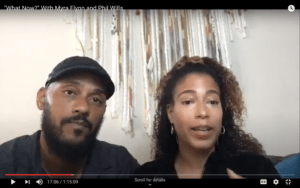
Myra Flynn and Phil Wills speak about Black Lives Matter protests
I also suggest watching this video made by Myra Flynn, an old friend and black singer from Vermont who spoke very insightful truths for her white and rural fan base to understand systemic racism and Black Lives Matter in a very gentle and loving way.
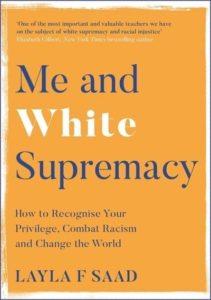 To dig in a little deeper, consider starting a book group with other white people to read or listen to Me and White Supremacy by Layla F Saad, something I am reading now and discussing with a book group. It’s a very powerful was to begin to understand socialization in whiteness and how it comes across in our engagement with people of color.
To dig in a little deeper, consider starting a book group with other white people to read or listen to Me and White Supremacy by Layla F Saad, something I am reading now and discussing with a book group. It’s a very powerful was to begin to understand socialization in whiteness and how it comes across in our engagement with people of color.
My Commitments
Personally for me, my work since going through cancer and the spiritual and social awakening I continue to learn from and grow with, is committed to transforming cultural systems with equity and justice for all. I will make mistakes and I have much to learn. I will hold space for uncomfortable conversations and accept that things get messy. I will lose friends and be judged, yet I will stand for empathy, humanity, and racial justice for this long-term journey.
Thank you for honoring love and compassion for yourself and others by reading this. Please share if you feel it will be helpful for white people you know and much love as we navigate this turbulent road. Please try to listen and keep an open heart and ask the same of others.
Learn more about EmpowR equity services.
Please consider becoming an EmpowR Patreon to join our community of co-creating change!
